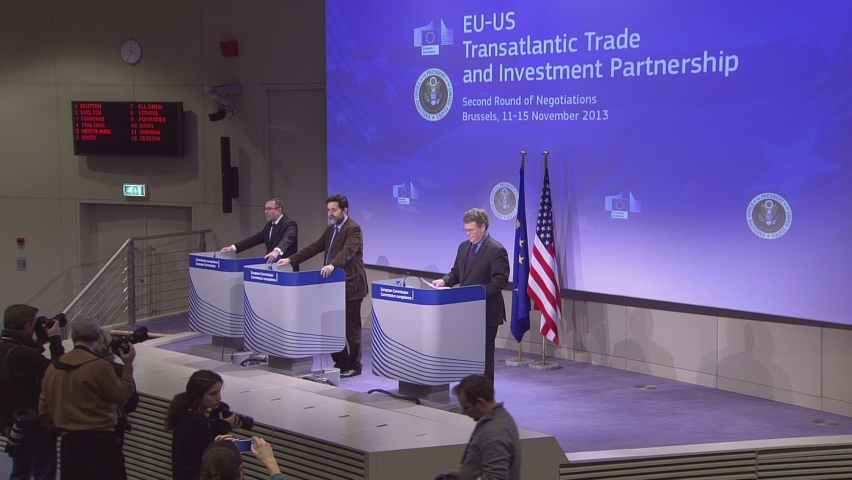The sixth round of the Transatlantic Trade and Investment Partnership (TTIP) talks between the U.S. and the EU is set for the week of July 14-18 in Brussels, Belgium. A recent Senate Finance Committee hearing on trade rule enforcement highlighted the issues related to soybeans and chicken meat. These issues are long-running disputes that must be resolved for the negotiations to move forward. The talks are only a year old and the difficult issues are now beginning to be addressed.
The major soybean issues outlined by the American Soybean Association (ASA) are biotechnology issues that also apply to corn. The ASA has asked the Administration to make trade in biotech commodities and products a top trade policy priority. Four changes must be made by the EU before the agreement is completed or be incorporated into the agreement.
The first step is to comply with the EU’s own regulations and timeframes for making science-based decisions on biotech products for import. This includes improved timeliness of European Food Safety Agency scientific reviews and Member State or Commission decisions. Regulatory delays in importing countries have costly impacts on the entire U.S. value chain and can lead to delaying commercial launch of a new trait. ASA has joined 14 other major national trade associations to form the U.S. Biotech Crops Alliance (USBCA), which is working internationally to find a consensus on how to achieve synchronous biotech regulatory approvals.
The second step must be the establishment of commercially meaningful tolerances for the low-level presence (LLP) of biotech events approved by U.S. regulatory authorities but not by EU regulatory bodies. The current tolerance level is zero. If approvals were internationally synchronized, this would not be an issue.
The global discussion on LLP has not advanced, and ASA believes U.S. leadership on this issue is critical to bringing other countries to the table.
The third step is a minor point for now, but one that sets a bad precedent and is inconsistent with the EU’s WTO commitments. Poland has an unjustified law which bans the use of biotech ingredients in animal feed. Implementation has been delayed until 2017, but it has no basis in science and restricts trade and should be repealed.
The last step is a big one. The EU’s mandatory traceability and labeling requirements of biotech crops must be modified or replaced with non-discriminatory rules that allow food manufacturers to market – and consumers to choose – GMO-free products without stigmatizing all other food products that contain ingredients produced via non-organic, modern or traditional agricultural practices. In 1999 and 2004, the EU adopted laws and rules which require that products containing more than 0.9 percent of a biotech ingredient be labeled. Rather than face negative reactions by consumers to pejorative labels, food companies reformulated their products, effectively eliminating biotech-derived foods in EU supermarkets and restaurants.
The purpose of the biotech labeling requirement is supposedly to provide information to EU consumers who wish to purchase non-biotech products. Establishing voluntary labeling standards for non-biotech foods could have accomplished the same objective without distorting trade. A WTO Member is obliged to choose a less trade-restrictive measure if one is reasonably available.
The ASA brought up WTO commitments several times. They argue that if the WTO members respected their obligations about establishing rules and regulations based on science and risk assessment, current trade barriers would disappear. ASA believes that WTO enforcement tools exist, but has increased focus on working with important trading partners to remove barriers to trade through negotiations to resolve problems without litigation.
ASA explained that WTO litigation has already been tried. In 2003 a WTO panel ruled that the EU was guilty of undue delay in the processing of applications. The U.S. government pushed hard for changes in EU practices, and the situation improved marginally, as the moratorium on processing applications was removed and the EU Commission restarted the approval process. Delays persist, and significant political interference in the risk management process continues.
ASA also noted that statements have been made by EU negotiators that no biotech laws or regulations will be changed as a result of a new agreement. Trade agreements by their very nature require some changes in laws and regulations by all parties to implement agreements.
The National Chicken Council (NCC) had a very straight forward message. They have been shut out of the EU chicken market since 1996 because they use hyper-chlorinated water to combat potential surface contamination of chicken which has been approved by the Food Safety & Inspection Service (FSIS) of USDA, but that is not accepted by the EU. Every week, U.S. citizens safely consume approximately 156 million chickens, yet FSIS-inspected chicken is somehow unsafe for European consumers. Several attempts have been made to resolve the issue, but none have resulted in resolution of the dispute. TTIP would only be of value for the U.S. chicken industry if this sanitary-phytosanitary (SPS) barrier were removed. The NCC reported that Germany’s Chancellor, Angela Merkel said she would never permit U.S. chicken to be imported into Europe.
The SPS issues associated with soybeans and chicken are just two of the many reasons that industry leaders are skeptical that a TTIP agreement, including agricultural issues, will ever be concluded. The SPS issues have become so intertwined with EU politics that it is unimaginable that they would be pulled apart. But the EU political leaders knew all this before they pushed ahead with the talks. The only approach the U.S. government can use to achieve a satisfactory outcome is to hold firm on the science of the issues and the EU’s WTO commitments.
Ross Korves is a Trade and Economic Policy Analyst with Truth About Trade &Technology (www.truthabouttrade.org). Follow us: @TruthAboutTrade on Twitter |Truth About Trade & Technology on Facebook.

